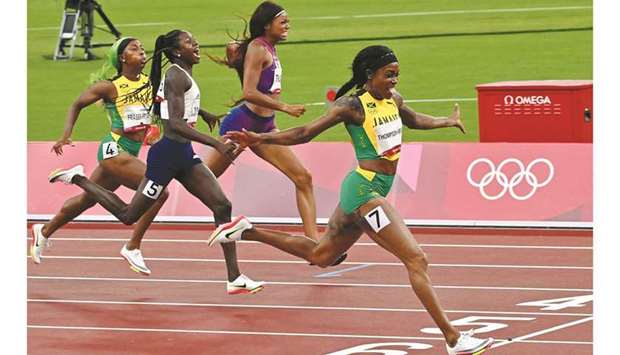Elaine Thompson-Herah made Olympic history in Tokyo yesterday, emulating fellow Jamaican Usain Bolt to complete an unprecedented women’s sprinting “double-double” with victory in the 200 metres.
Thompson-Herah, the 2016 Olympics 100m and 200m gold medallist who defended her 100m title on Saturday, sealed a record fourth individual gold after storming home in a blistering 21.53sec. Namibian teenager Christine Mboma took silver in 21.81sec while the USA’s Gabby Thomas won bronze in 21.87sec.
The 29-year-old Thompson-Herah’s time was the second fastest in history after Florence Griffith Joyner’s world record of 21.34sec set at the drug-tarnished 1988 Seoul Olympics. As well as becoming the first woman to claim a 100m-200m double-double, emulating Bolt, who eventually won three consecutive 100m-200m Olympic titles, Thompson-Herah is the only female track and field athlete to win four individual Olympic track golds.
“It really means a lot to me to be in that history book, because I’ve been through a lot and it tells my story,” Thompson-Herah said. The Jamaican favourite had got off to a blazing start, building a lead off the bend which she never relinquished as she motored to the line.
It looked as if Thomas and Jamaica’s Shelly-Ann Fraser-Pryce would take the silver and bronze, but that duo were passed by a scorching finish over the final 20 metres from the 18-year-old Mboma who plundered silver. “The mission was to go again and capture the medal, which was the plan,” said Thompson-Herah.
Thompson-Herah had faced a battle to qualify for Tokyo, with a niggling Achilles problem hampering her fitness earlier this season. She finished third in the 100m and 200m at the Jamaican trials behind Fraser-Pryce, who had entered the Olympics as Jamaica’s main threat.
“It hasn’t sunk in yet,” Thompson-Herah said. “I don’t want to get too excited, because I haven’t slept since the 100m final. “I don’t know how I’ve done it, I’ve been laying down, not sleeping but I’ve still managed to come out here.”
Namibian teen Mboma was only running the 200m because she and compatriot Beatrice Masilingi, who finished sixth in 22.28sec, are barred from their preferred distance of 400m under international rules because they have heightened testosterone levels. Under World Athletics regulations, they would have to undergo treatment to lower their testosterone if they want to compete in distances from 400m to a mile.
The USA may have struggled to translate finalists into gold over the opening five days of track and field, but two of their next generation showed there is plenty of talent on the way up.
Athing Mu, 19, was an impressive winner of the women’s 800 metres — the first American to do so since Madeline Manning in 1968. Her fellow teenager Erriyon Knighton qualified for today’s men’s 200m final — the youngest finalist since fellow 17-year-old Ade Mafe of Britain in 1984.
The field event finals also had their fair share of drama. German long jumper Malaika Mihambo prevailed in a classic duel with 2012 gold medallist and four-time world champion Brittney Reese of the United States. Mihambo was lying in the bronze medal position ahead of her final jump, but hammered down the runway to register a season-best of 7.00 metres and emerge victorious.
Armand Duplantis won the men’s pole vault with a best mark of 6.02m. However, there was more drama than during the actual competition after he had secured the gold. The Swedish star went devilishly close in two of his three attempts at beating his own world record of 6.18m.
The field event fraternity would not permit the track glamour brigade to have all the headlines. Poland’s Anita Wlodarczyk became the first female athlete to win the same track and field event three times with victory in the hammer.
The 35-year-old Pole, who won golds in the 2012 and 2016 Games, succeeded where Valerie Adams (shot put), Sandra Perkovic (discus) and Shelly-Ann Fraser-Pryce (100m) had fallen short at these Games. “I was dreaming of becoming the queen of the hammer throw,” she said.

Jamaica’s Elaine Thompson-Herah (right) crosses the finish line to win the women’s 200m final during the Tokyo 2020 Olympic Games in Tokyo yesterday. (AFP)
